Speed vs. Perfection: How Top Entrepreneurs Dominate Winner-Takes-All Markets

Operating with diligence is often a decisive factor in startups’ successes. In some industries, the first to market wins. In others, it’s the company that innovates most consistently or serves customers best. However, in winner-takes-all markets, the rules are different. Moving fast is the name of the game. Few remember Friendster, Google+, Sidecar, Viadeo, or Dailymotion—they were beaten to scale by Facebook, Uber, LinkedIn, and YouTube.
In 2011, Mark Zuckerberg identified Instagram as a serious threat to Facebook’s dominance in the photo-sharing space. In a now-famous email, he ordered his team to ship fast. His email offers valuable insights for any Founder, highlighting the tension between building more features and getting to market.
In this article, I break down why moving fast matters more than perfection and how this principle plays out in winner-takes-all markets. We’ll also explore how Founders can navigate the tricky balance between shipping quickly, learning from the market, and battling the fear of failure.
In This Article
Zuckerberg’s Email and the Instagram Threat
In September 2011, Facebook was a dominant force, but it wasn’t invincible. The internal email Zuck sent to his team reveals a Founder deeply aware of how quickly things can change. At that time, Instagram was growing rapidly, attracting millions of users with its focus on one simple feature: sharing beautiful photos easily on mobile.
Zuckerberg recognized that Facebook’s News Feed was being used primarily for sharing images, but Instagram had done it better—faster, more visually appealing, and designed specifically for mobile use.
I view this as a big strategic risk for us if we don’t completely own the photos space.
Mark Zuckerberg – Facebook
In his message, Zuckerberg insisted on the urgency of launching Facebook’s own mobile photos app. His fear was clear: if they didn’t move quickly, Instagram could dominate this space. He even identified the risk of Instagram being acquired by a competitor like Google, which could leverage the app’s growing popularity against Facebook.
The speed at which Instagram was growing—it was doubling its user base every few months—only added to the pressure.
Zuckerberg’s message was simple: speed is critical, and owning the photo-sharing space on mobile was a strategic priority. He knew that Instagram had tapped into something users loved—photos. If Instagram continued its rapid ascent, it could take a significant chunk of Facebook’s user activity away, threatening Facebook’s dominance.
Eventually, Facebook acquired Instagram for $1 billion in 2012, a move that was both bold and decisive. (More on it below).
It is clear that Zuck believed Instagram might have been the social network we all use today instead of Facebook. This scenario highlights a crucial lesson for Founders: in winner-takes-all markets, speed is more important than perfection.
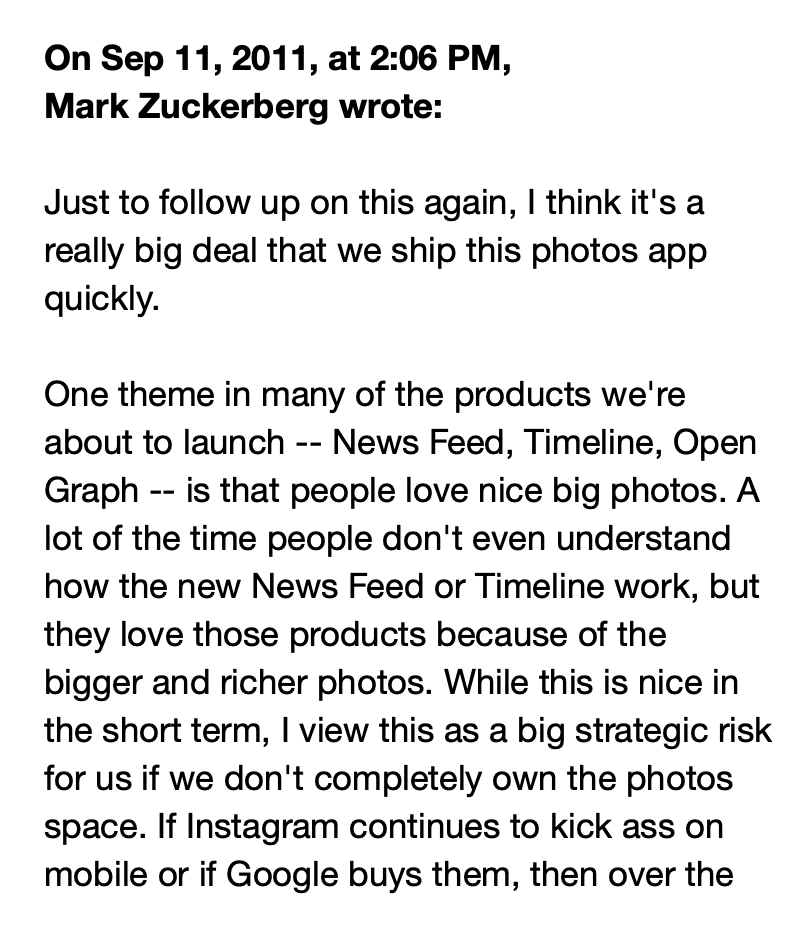
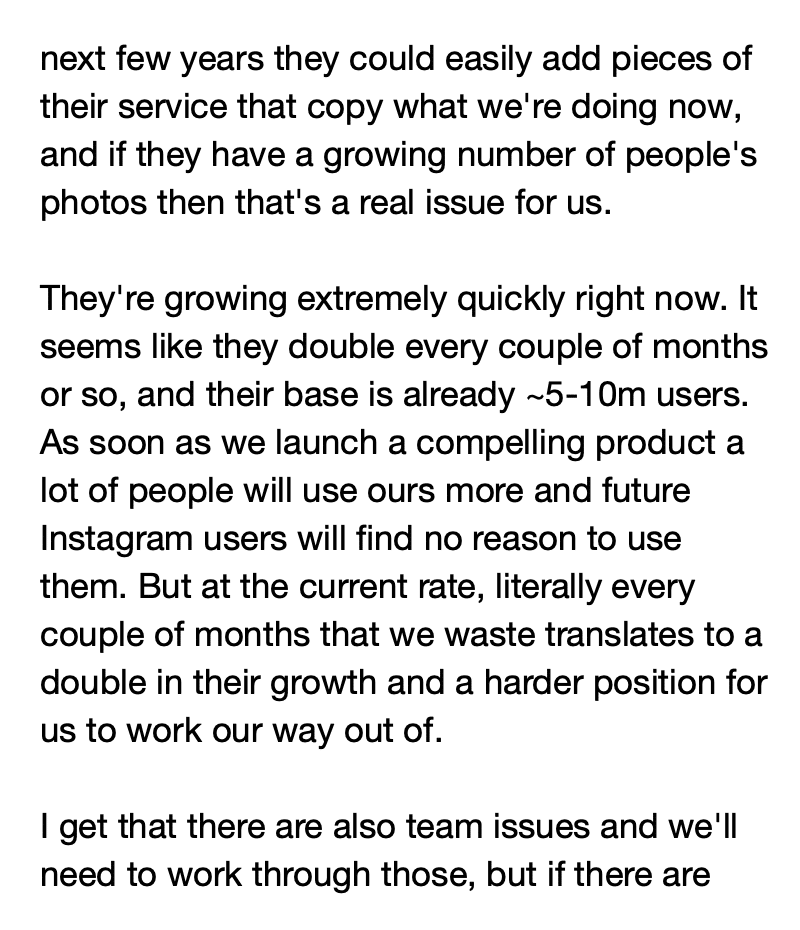
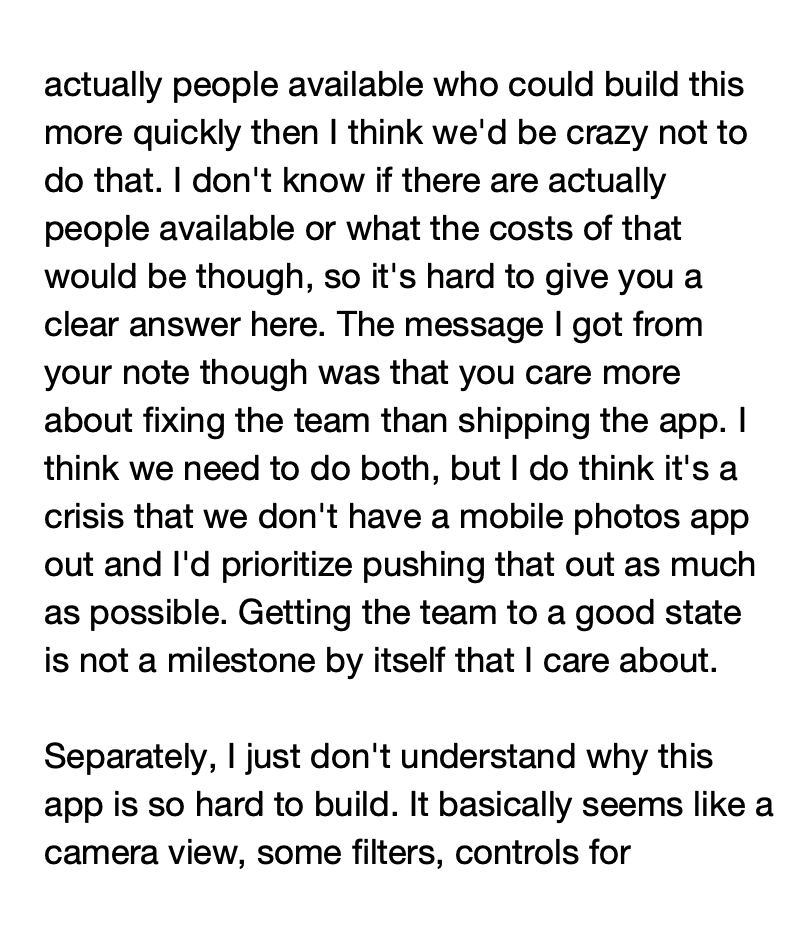
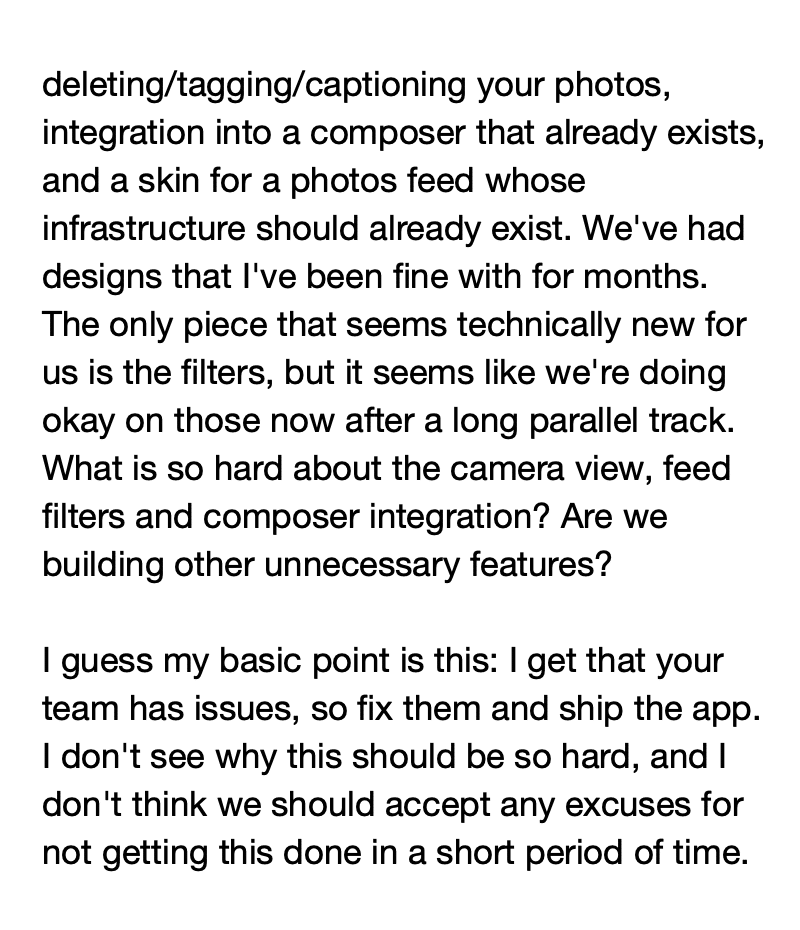
Winner-Takes-All Markets: Why Speed Matters
Not every market operates on a winner-takes-all basis, but when they do, the stakes are incredibly high. These markets tend to exhibit network effects, meaning the more users a product or service has, the more valuable it becomes.
Social media is a prime example of this dynamic. Users flock to platforms where their friends are, creating a positive feedback loop.
Read this essay on network effects for more details.
In a winner-takes-all market, the first company to scale captures the majority of the share. There’s only one dominant search engine (Google Search), video sharing & viewing platform (YouTube), professional social network (LinkedIn), or e-commerce giant (Amazon, at least in the West).
Winner-takes-all is about speed, but not necessarily about being first—Google was the 12th search engine, Facebook arrived long after MySpace and Friendster, and Apple was not the first smartphone maker. The objective is to become the platform everyone uses. Barriers to entry and exit, such as network effects, help consolidate dominance.
This is what Zuckerberg saw in Instagram: it was growing faster, users loved its simplicity, and it had the potential to dominate mobile photo sharing. He knew that waiting too long could cost Facebook its lead in one of the most crucial segments of user activity.
I get that your team has issues, so fix them and ship the app.
Mark Zuckerberg – Facebook
Why did Zuck insist so much on “shipping the app?”
For startups in winner-takes-all markets, speed trumps perfection. By the time Founders perfect their products, it may already be too late.
Instagram didn’t have the most features when it launched, but it had the right ones. It resonated with users because it focused on one thing and did it exceptionally well: mobile photos—allowing the startup to grow fast, attracting millions of users in a short period.
As I mentioned in my post on unit economics, these types of markets are rare, but when they exist, the rewards for speed are disproportionately large. Read the article below for more details.

Go Further: How Venture Capitalists Evaluate Unit Economics
In fact, most industries don’t operate this way. There’s often room for multiple winners. Ironically, social networks turned out to be one of them—Facebook, Instagram, and Snap all compete for different segments of population and usages.
But in a few rare cases—such as social media back in 2011, online marketplaces, or search engines—the company scaling faster becomes the dominant player.
That’s why Zuckerberg’s sense of urgency was so well-placed: in a winner-takes-all market, speed matters more than having multiple features.
Winner-Takes-All Markets Require Launching Imperfect Products
One of the biggest barriers to moving quickly is the fear of launching an imperfect product. Many Founders believe that releasing something flawed will hurt their brand or reputation.
But as Zuckerberg’s email shows, there are times when the risk of not shipping is far greater than the risk of launching a product that isn’t perfect yet.
“Fail fast”, “Move fast and break things” (Facebook’s motto for years), “Fake it till you make it”, are all popular adages coined in Silicon Valley. Another one is LinkedIn co-Founder Reid Hoffman’s quote on shipping quickly.
If you’re not embarrassed by the first version of your product, you’ve launched too late.
REid Hoffman – Greylock
Launching fast doesn’t mean sacrificing quality altogether. The goal is getting something out there that works, so entrepreneurs can learn from real users and iterate quickly.
Launching an imperfect product is often the best way to achieve product-market fit. It allows startups to gather feedback, adapt to users’ needs, and improve the product in ways that would never be possible in a closed, internal development process.
It is particularly relevant in markets like social media, where user preferences can change rapidly, and staying ahead of the curve is vital. Founders who delay launches because they’re constantly tweaking features or polishing the product risk missing their window of opportunity.
Learn more about product-market fit and the metrics VCs use to assess it in the article below.
Zuckerberg himself expressed frustration in his email about why the Facebook Photos app was taking so long to launch.
To him, it was a straightforward project—essentially just a camera view with filters, tagging, and a feed. Yet delays persisted because the team seemed focused on unnecessary complexities.
It is a common challenge in startups: getting lost in the weeds of product development instead of focusing on getting a functional version out to users.
Fear of Failure: Overcoming the Perfection Trap
I’ve long wondered what held Founders back from launching imperfect products and learning from customer feedback.
One obvious answer is the fear of failure. Many Founders hesitate to launch because they’re afraid the product isn’t good enough. They fear backlash from users or negative feedback from Investors.
But as I’ve discussed before, fear of failure is often more damaging than failure itself. Failing fast can provide valuable lessons that help a company pivot or improve in ways that waiting to add more features could never achieve.
What is so hard about the camera view, feed filters and composer integration? Are we building other unnecessary features?
Mark Zuckerberg – Facebook
Zuckerberg’s insistence on launching the Photos app quickly was rooted in his understanding that you can’t afford to wait for perfection in a rapidly evolving market. His focus wasn’t on launching a flawless product, but getting something into users’ hands so they could iterate based on real feedback.
My research into entrepreneurs psychology has revealed that perfectionism is the root issue behind the fear of failure in entrepreneurship.
If only I had a nickel for every time a Founder told me: “But you don’t get it. We need to add this and that feature before we ship the product, otherwise, it doesn’t make sense!”
I analyzed the link between perfectionism and the fear of failure in the article below, where I also show there are two forms of perfectionisms—one moving Founders forward (Steve Jobs), the other holding them back (almost everyone else).
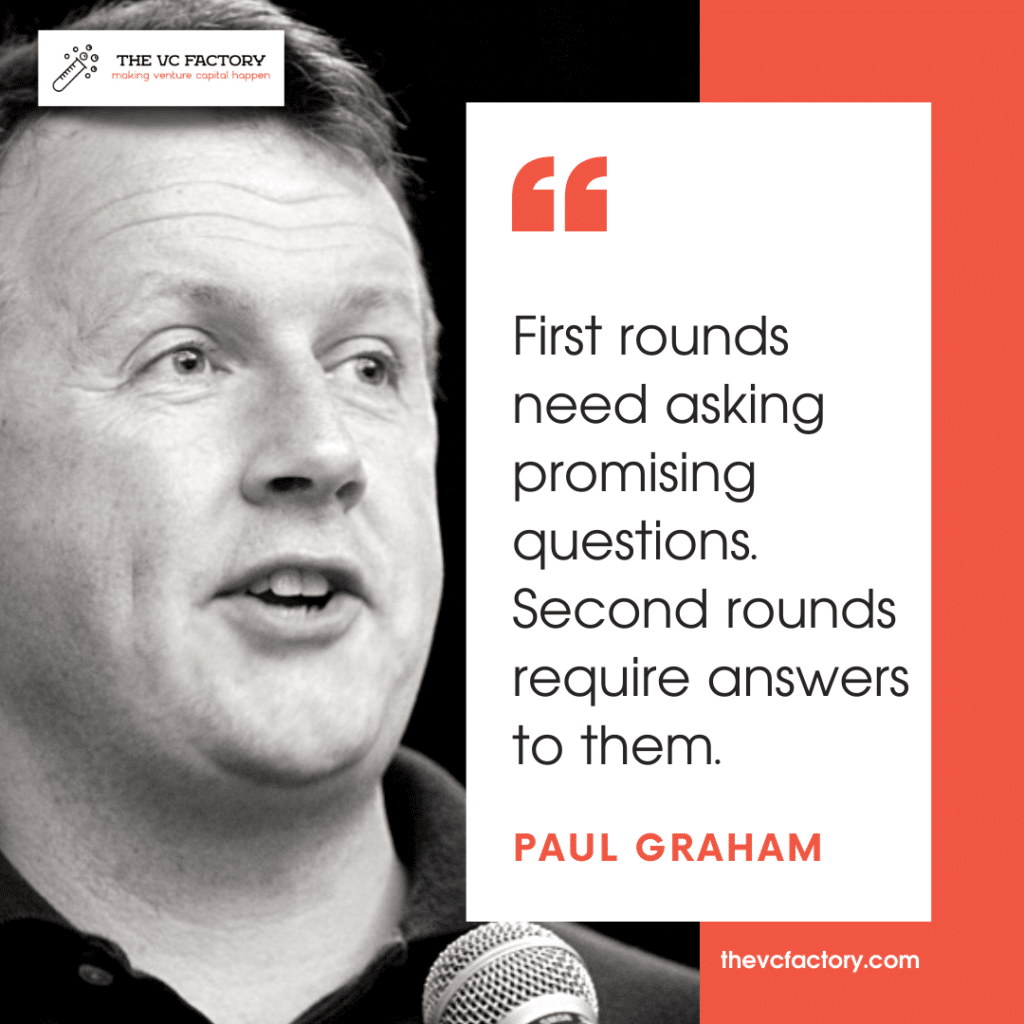
Epilogue: “Instagram Can Hurt Us”
In February 2012, just two months before Facebook acquired Instagram, Mark Zuckerberg sent another critical email to his CFO, David Ebersman.
In this exchange, Zuckerberg floated the idea of acquiring smaller competitors like Instagram, Path, and Foursquare. What stands out in this email is Zuckerberg’s acknowledgment of the looming threat these companies posed to Facebook.
He specifically mentioned how Instagram’s growing user base and established brand could be disruptive to Facebook’s mobile strategy if left unchecked.
Mobile apps [like Instagram] are nascent but the networks are established, the brands are already meaningful and if they grow to a large scale they could be very disruptive to us.
Mark Zuckerberg – Facebook
In his response, Ebersman questioned the value of acquiring these companies, pointing out that most acquisitions fail to generate the expected returns. Yet, Zuckerberg persisted, revealing his real goal.
Zuckerberg’s words—“what we’re really buying is time”—highlight the urgency he felt. He knew that even if new competitors emerged, purchasing Instagram would give Facebook enough of a lead to scale and implement Instagram’s social dynamics before others could catch up.
It was a calculated effort to maintain Facebook’s dominance in this winner-takes-all market.
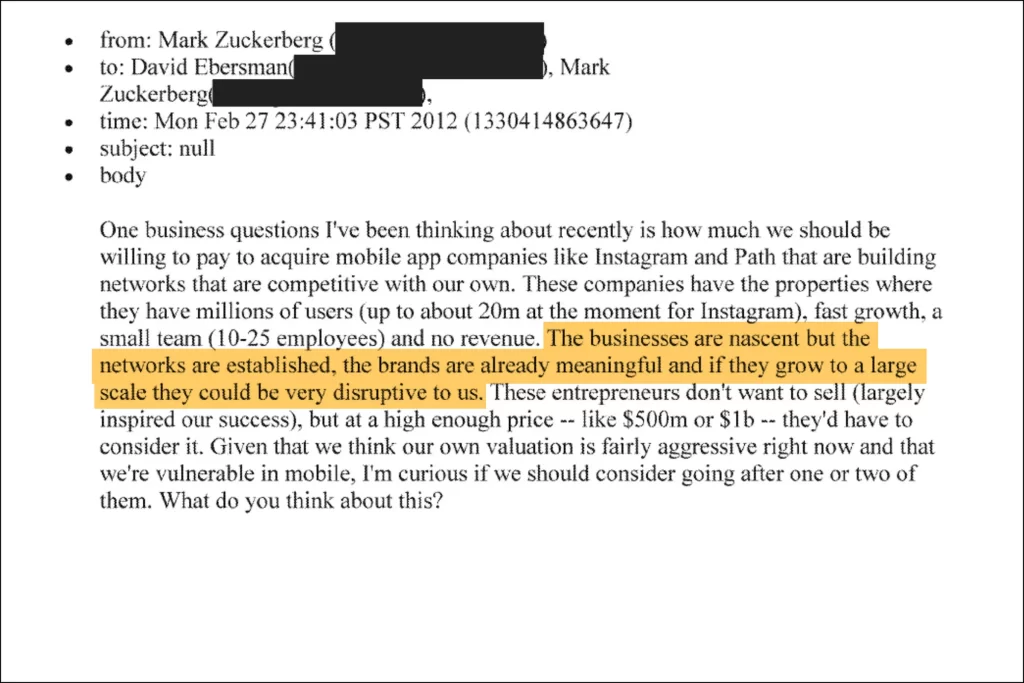
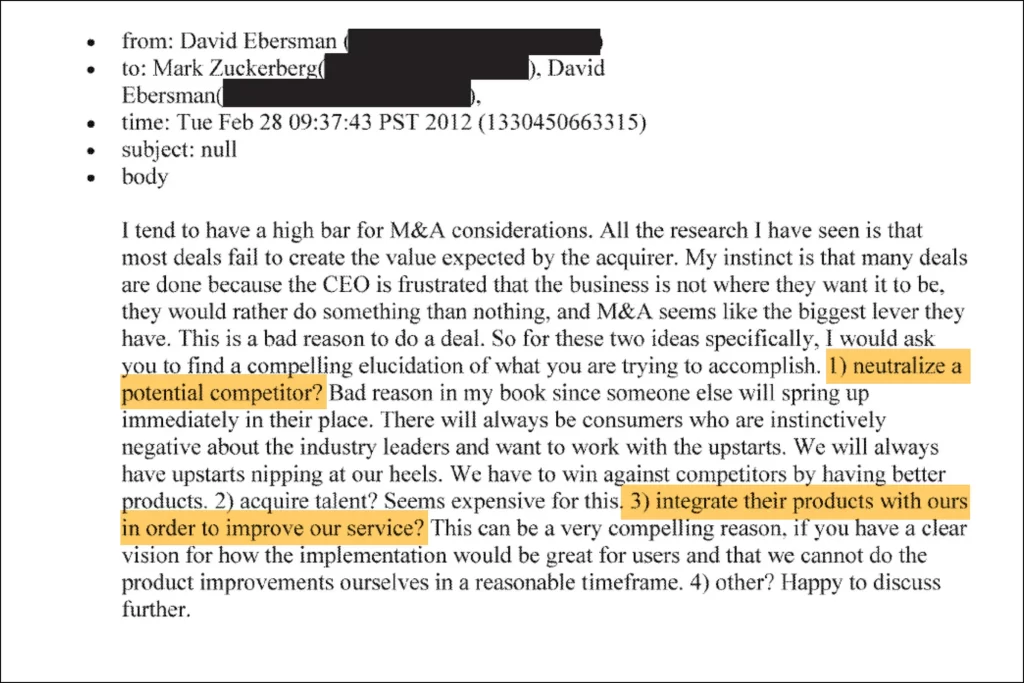
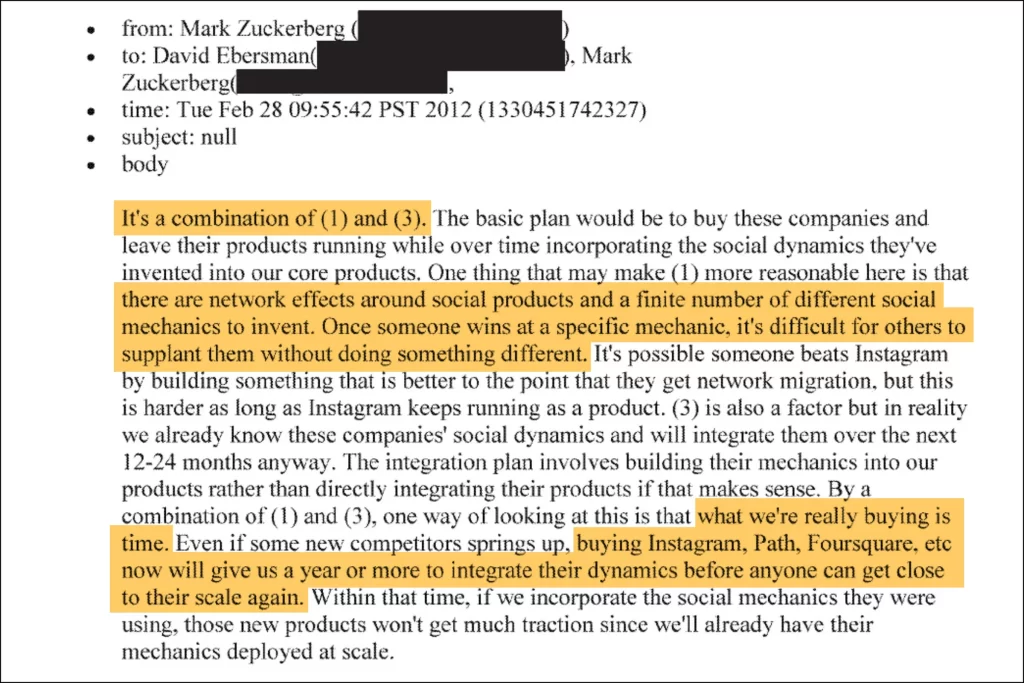
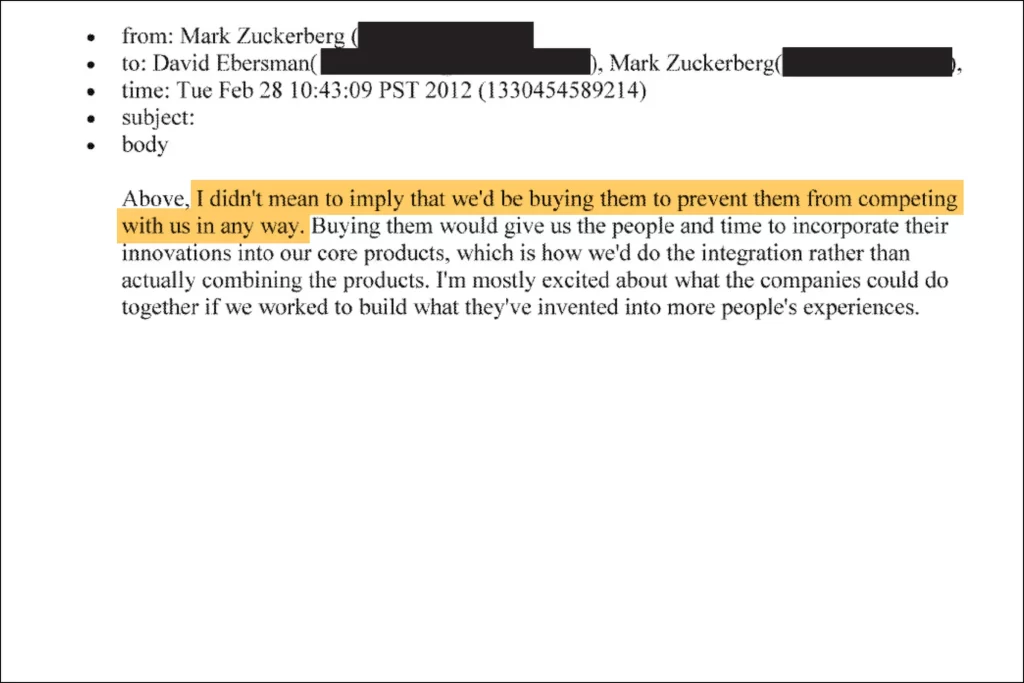
Interestingly, 45 minutes later, Zuckerberg sent a follow-up email to clarify his earlier remarks. He backpedaled slightly, stating that he didn’t mean to imply they were buying Instagram solely to prevent competition.
However, the initial email—and the later congressional scrutiny—illustrates how deeply Facebook viewed Instagram as an existential threat and how critical speed was in the race to dominate the mobile social media space.
Conclusion: tl;dr
Mark Zuckerberg’s 2011 and 2012 emails offer a powerful reminder of the importance of speed in certain markets. For startups operating in winner-takes-all environments, waiting too long to launch can be fatal.
Moving fast allows them to capture market share, learn from users, and iterate quickly. The fear of launching an imperfect product or failing is natural, but it’s often misplaced. In most cases, the lessons learned from getting something out there far outweigh the risks of launching too soon.
The key takeaway for Founders is simple: Don’t let the pursuit of perfection slow you down. Ship, learn, and iterate.


